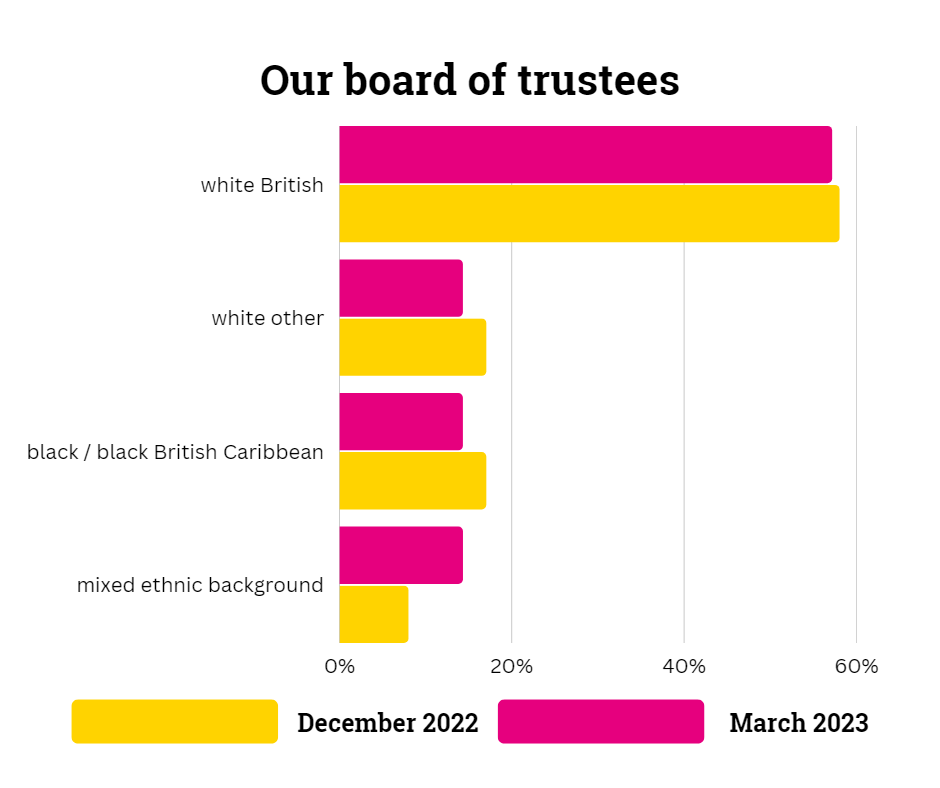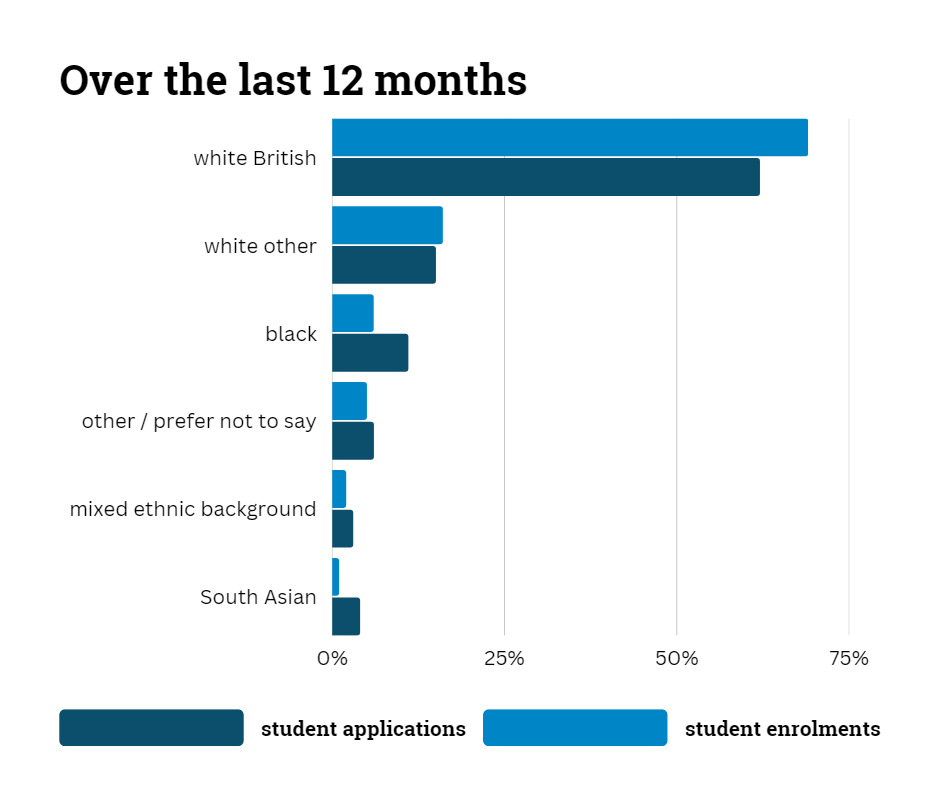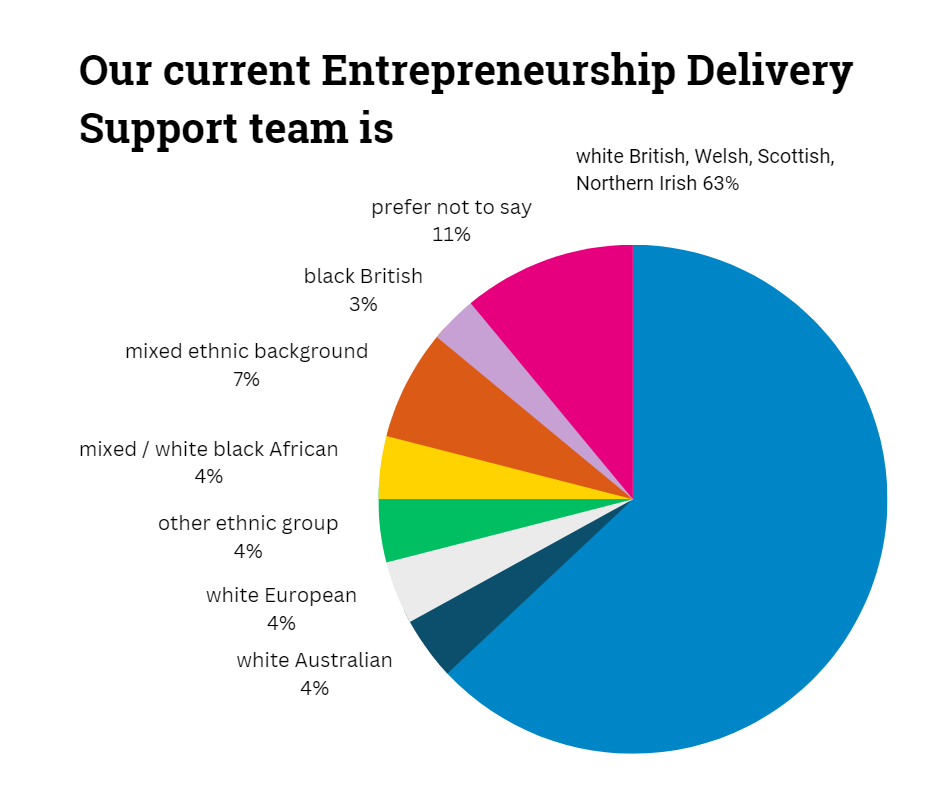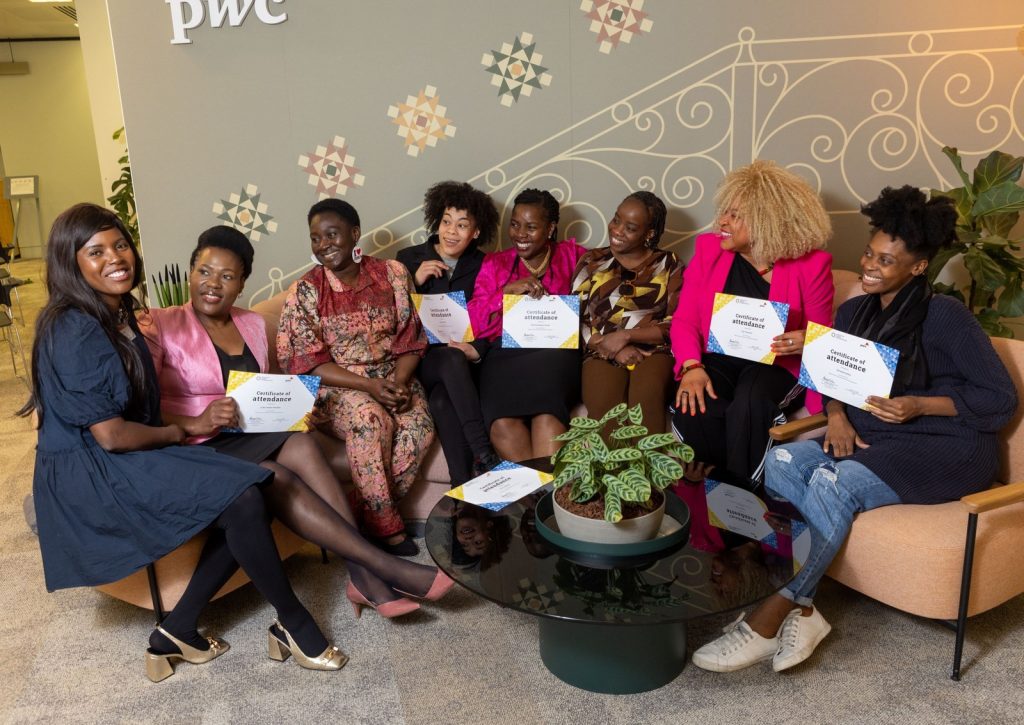Update on anti-racist commitments June 2023
22 Jun 2023
Welcome to our biannual bulletin on SSE’s action against racism. Having pledged in December 2022 to act as EDI (Equity, Diversity and Inclusion) Hustlers, making EDI a priority in all that we do. This update details our work to share power, wealth and opportunity more equally within our organisation and through our programmes.
We are stepping up our activities in this space and are glad to see the diversity of our senior team has increased in the last year (Indicator 3).
A key indicator for us is student diversity and that has dipped over the last 12 months, bucking the trend of recent years. We interpret that in part this comes from an increase in programmes delivery where our recruitment reflects the demographics of the region. This is not the outcome we’d worked for, but we are glad that our monitoring has revealed it and will work to address it. With EDI now at the core of our strategy we are already addressing this crucial metric through partnerships, recruitment and grant making (see Indicator 1 below).
EDI is everybody’s business at SSE, and something our team is building together. To ensure selection for learning programmes and staff roles are as equitable as possible, we’ve workshopped solutions for fair recruitment in a dedicated whole meeting.
This work is not easy, and we will continue to improve the way we capture data, take action on the results, and tell the whole story here. We’ll be updating our progress on all these pledges in a few months’ time.
If you think we could be doing more to become truly inclusive and equitable, please let us know by mailing [email protected] and write “FAO EDI lead” in the subject line or top of your email.
1. Keep learning and challenging ourselves to be anti-racist
Our commitment: We will analyse, reflect, learn and challenge ourselves, and our community, to be anti-racist – now and on an ongoing basis.
Measuring progress
Indicator 1: Update on action plan for 2023-4
- Our 10-year EDI (Equity, diversity and inclusion) strategic roadmap has been refreshed for 2023-24 with three new priorities under our ‘EDI hustlers’ mandate. These will facilitate progress in line with our new priorities.
- Work in partnership with EDI led funding partners, to ensure even greater reach into EDI communities. Share outcomes and encourage this approach to influence the sector.
- Recognise primary and secondary lived experience of EDI factors in student applicants, where relevant to the impact they aim to achieve.
- Bring our SSE fellows into our grant-making process, ensuring that their rich lived and learnt experience is reflected in our decision-making.
- We have established an EDI working group, including members from several departments, in order to champion EDI goals and cascade information throughout the teams, through both departmental, and whole team meetings. This working group also undertakes reporting and monitoring, using a project management tool, helping us to achieve against our goals.
- We have embedded other priorities from the original 10-year EDI roadmap into our operational planning, ensuring that EDI is consistently championed throughout the organisation.
- From a data point of view, we are establishing a baseline for diversity across SSE, for future comparison. This is part of a new EDI survey for staff launched in January.
- We involve fellows in our grant-making process, but are working on integrating this further, to ensure that the lived experience of our fellows and their rich diversity is reflected in our processes.
Indicator 2: Actions and target outcomes published as part of new three-year strategy
In 2021 we agreed EDI Priorities for 2022-23. These are tied in with our EDI committee and we have progressed in the following areas
- Data: Continue to develop our systems and capabilities with data and ensure this is fully utilised in our strategies, planning and decision-making. We will establish baselines for reporting on EDI to SMT (Senior Management Team) and the Board, relating to staff, students and suppliers.
- Over the last 12 months our learner data has seen an uplift of 3% in enrolments of people who identify as Black. There has also been an increase of 3% in learners from a bi-racial or multi-racial background.
- Recruitment: We will review our recruitment practices for both staff (through our people strategy) and students (through our customer journey work), addressing where we can make changes to ensure greater equity of process, more diverse candidates and inclusive experience.
- We have held workshops with all staff on our customer journeys and digital transformation projects, and separate sessions to review recruitment practices for our staff and learners, with a focus on EDI.
- Grant-making: We will bring our SSE fellows into our grant-making process, ensuring that their rich lived and learnt experience is reflected in our decision-making.
2. Diversify our staff team, senior leadership, and board
Our commitment: We will increase the representation of people from Black and other racialised and minoritised communities* in our staff team, particularly at senior level and among the trustee board. We will publicly set and report on diversity indicators.
Measuring progress
Indicator 3: Diversity of staff team, including at senior level
- Our recent staff survey showed that 22% of staff at SSE are from Black and minoritised ethnic backgrounds, compared with 18% in the 2021 staff survey
- In our last report, we acknowledged that there were no people from racialised and minoritised communities in our SMT. Following recent recruitment, 20% of our SMT (1 of 5) describe their backgrounds as black or minoritised.
- Our staff survey provided us with crucial information about our team, and the improvements we can make moving forward.
Indicator 4: Diversity of our trustee board

3. Diversify our programmes (people and content)
We will increase the racial and ethnic diversity of participants on our programmes at all stages, from pre-start to scale, as well as provide targeted programmes of support for people from Black and other racialised and minoritised communities. We will make our programmes more inclusive to achieve this, in particular, by improving our recruitment and selection processes and by diversifying our delivery team (e.g. assessors, speakers and facilitators).
Measuring progress
Indicator 5: Diversity of student population
There have recently been some structural changes, including undertaking fewer London-based programmes in favour of new programmes in rural areas, where communities are often less diverse. This will be taken into consideration for future programmes.
- Our last report indicated an increase in the proportion of Black students we support, from 11% to 14% since January 2021, the latest figures show a reversal of that trend.

In contrast to our previous update, the percentage of students from minoritised groups attending courses is lower than those applying, while white applicants are more likely to be given places. This indicates that more positive action is required – an indication that our current working on improving selection processes deserves continued focus. This will be a key theme for our EDI working group in coming months.
We have partnered with V4CE (Voice 4 Change England), the leading national advocate for Black and Minoritised voluntary and community sector organisations. V4CE will be heavily involved in redesigning our application forms, selection criteria and boost our networks to ensure greater reach and enrolment.
Through our work with V4CE, with support from the Connect Fund, we will seek to improve EDI outcomes for both its recruitment and enrolment statistics on Match Trading programmes, which we will then feed into our wider programme portfolio. This includes a ‘360-degree Review’ of SSE’s data model and data protocol, advice on making our application form more accessible, expert analysis on our recruitment materials and a guided workshop on EDI standards.
Indicator 6: Diversity of entrepreneurship delivery team (assessors, speakers, facilitators)
- We are still working to establish new mechanisms for collecting EDI data for all suppliers, freelancers, and external contributors, and will implement this throughout the year, before providing an updated report in December 2023.

Indicator 7: At least two targeted programmes for people from racialised and minoritised backgrounds established by end of the financial year
- We are currently part-way through our 3-year partnership with PwC, which commenced in January 2022.
- We have already delivered the first year of programmes, supporting 15 black social entrepreneurs in total, as well as hosting a graduation for participants, pictured below.
- We will deliver 1x Start Up Programme in Scotland and 1x PwC black Social Entrepreneurs Programme in England per year, for the next two years.
- We have delivered our Black Social Entrepreneurs Futures programme with Gowling WLG.
In the coming year we aim to identify key themes within local communities, such as the cost of living crisis and ‘levelling up’, climate action and diversity, female entrepreneurship, and prospects for young people. We will match these themes to funders and a secure pipeline of early-stage students, to address systemic racism and inequality.

Indicator 8: Multi-stakeholder learning captured, shared internally and externally, and used to inform future action
- Our partnership with Voice4Change England (V4CE) led to a joint launch of our UK Government funded VCSE (Voluntary Community and Social Enterprise) Contract Readiness Programme. This achieved very rapid results and we look forward to the EDI reporting
- SSE teams have also attended an V4CE led workshop focused on EDI in recruitment
- A Whole Team Meeting engaged all SSE staff in workshopping EDI priorities
- We are exploring further action to share these learnings, for example
- 360-degree review sessions focused on how diversity targets were addressed or achieved
- How to collate this information to entrench best practice
4. Influence our supply chain and funders
We will increase diversity in our supply chain and promote and influence funder action on anti-racism, through who we work with and how we engage. This means working with funders and supporters who are willing to work alongside us to continue to learn and develop their practice to be anti-racist.
Measuring progress
Indicator 9: Increase in the number and value of supplier contracts held by people from Black and other racialised and minoritised communities in our supply chain
- We have updated our procurement policy to include a section on EDI considerations.
- We are ensuring that procurement decisions always include suppliers from diverse backgrounds, to provide equal opportunities for suppliers led by under-represented groups.
- This enables SSE to contribute to increasing social inclusion, reiterating our commitments to diversity and equitable practises.
- We will ensure we are selecting suppliers who are in line with our values, from diverse backgrounds. To do this, we will positively select suppliers from black and racially minoritised groups, as per our Anti-racist Commitments.
- We will be utilising our pool of fellows, where appropriate.
- We will use directories such as blackpoundday.com
Indicator 10: Existing funder/supporter commitment to anti-racism assessed and a framework agreed for facilitating meaningful and collaborative discussions to inform decision making regarding future opportunities
- In our April 2022 update we stated that in the narrative and budget for new projects we would show our commitment to inclusion with the following:
- We have started incorporating a narrative into bids and proposals
- Budgets are developed including a specific line for inclusion
- We have recently confirmed funding from Connect Fund, which will support the development of Match Trading. In particular, we are looking at how to best to bake in EDI considerations to the Match Trading portal from the outset.
- Working in collaboration with V4CE (Voice 4 Change England), we aim to increase the proportion of Match Trading grants awarded to black and ethnically social entrepreneurs / VCSEs to 27% over the next 5 years.
What’s next? We’ll continue to update on our commitments twice a year. We welcome feedback and ideas from our Fellows, learners, and funder community. Together we can make a difference. (*We know that language about identity is personal, and these terms won’t feel right to everyone. We mean people who may identify as Black, Brown, bi- or multi-racial, being from a diaspora, having Asian/African/Caribbean/Latinx/Middle Eastern/Indigenous heritage, as a “person of colour”, Jewish, and/or from a white ethnic minority such as Gypsy, Roma, Traveller. We have consulted our community to shape this language.)
